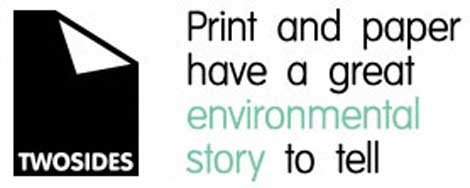
Two Sides, the UK initiative to promote the responsible production and use of print and paper, and encourage its use as an attractive, practical and sustainable communications medium, today announced that it is actively challenging companies which use greenwash to mislead consumers regarding the environmental benefits of alternative media.
Two Sides is requesting that companies carefully consider their messages and the potentially misleading anti-print and paper statements that are being made such as: 'go paper-free and do your bit for the environment' or 'e-billing is more environmentally friendly than the traditional paper bill'.
"It is important, when companies promote their products and services, that they do not damage the Print and Paper industry and jeopardise the livelihood of the many thousands of people employed therein with possibly misleading statements," says Martyn Eustace, Two Sides Director. "We will react to misleading statements whenever they arise and we are engaging with major corporates and utilities. There has, so far, been a reluctance to discuss but I have recently detected a changing attitude and realization that the issues which we are raising deserve debate and consideration."
Through its continuous monitoring, Two Sides often notices a lack of adherence to CSR guidelines. CSR Europe is the leading European business network for corporate social responsibility and its Sustainable Marketing Guide states that 'Green' claims should be truthful, accurate and able to be substantiated and not make comparisons unless the comparison is relevant, clear and specific. "It is clearly wrong," says Eustace "to claim that a product or service, for example a switch to online communication, is 'better for the environment' or 'uses less energy' without supporting evidence."
The link between reducing the use of paper and helping the environment creates a false impression about the sustainability of print and paper. Paper is a renewable and recyclable product that, if responsibly produced and consumed, is an environmentally sustainable media. In Europe, where 93% of our paper comes from, the area of forest has grown by 30% since 1950 and is increasing at a rate of 1.5 million football pitches every year. The forestry and paper industries are major guardians of this precious and growing resource.
The belief that e-communication is more environmentally-friendly than print is generally unproven and there is a lack of life cycle data to support such claims. What is increasingly clear is that electronic communication, and in particular the energy requirements of the increasing worldwide network of servers which are necessary to store all the information needed for immediate access, has a significant and increasing carbon footprint. Electronic communication and document storage must be recognised as delivering efficiency but not necessarily greater sustainability. In the UK it has been suggested that PC's and servers may consume up to 50% of the country's energy requirements in the next 10 years.
As Martyn Eustace explains, "Whilst all the benefits of electronic communication are clear, and initiatives to reduce waste are to be encouraged, Two Sides is concerned that incorrect and damaging impressions are being given if alternative e-communication channels are promoted as 'green' or seek to gain credibility by purporting to aid sustainability at the expense of responsibly produced print. All channels have an environmental impact and print remains a vital and effective part of the modern marketing and communication mix. We are asking all those who use the environment as a means to encourage customers to switch from print to e-communication, largely to reduce costs, to re-examine their messages as it is certainly not proven that this results in a lower carbon footprint. In fact, considering all the environmental costs of electronic communication, print and paper may well be the environmentally sustainable way to communicate."




